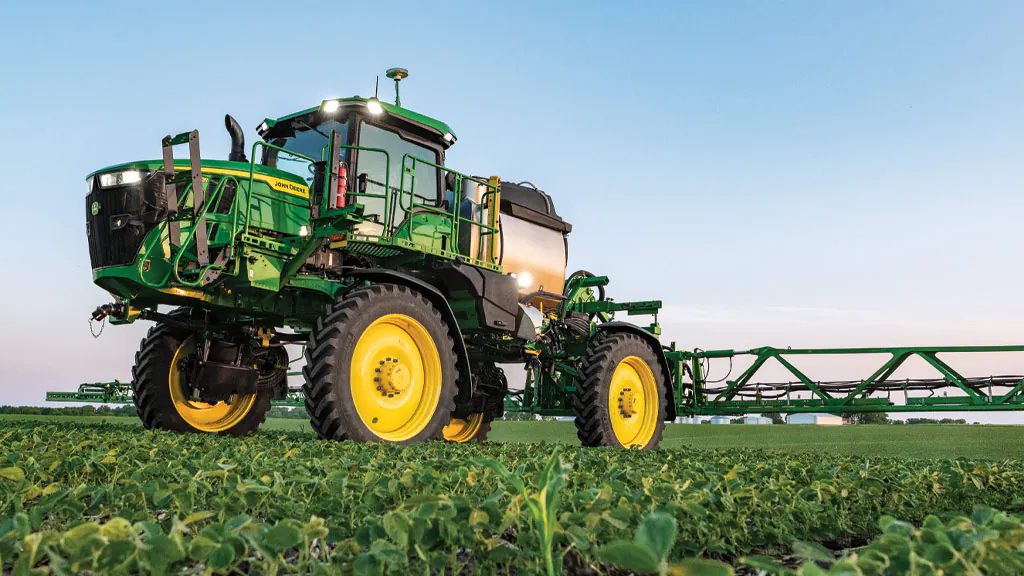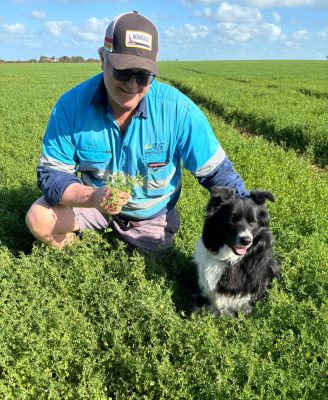
Paraquat is used to spot spray weeds through systems like John Deere’s See and Spray, while diquat is used as a desiccant in pulse crops particularly to maximise yield and quality. Photo: John Deere
AUSTRALIAN grain producers will be put under unnecessary pressure to rethink sustainable farming practices that benefit the environment if proposed changes to the use of two key herbicides are approved.
This is according to Grain Producers Australia southern region director Mark Schilling, one of thousands of growers who rely on timed applications of paraquat and diquat, colloquially known as the “quats” to desiccate crops ahead of harvest.
Ahead of its decision expected in the week starting 28 January 2025, and the final regulatory decision expected one month later, the Australian Pesticides and Veterinary Medicines Authority’s public consultation for the proposed regulatory decision on the use of quats is open until October 29.
In a special gazette published July 30 by the APVMA, it flagged a number of potential rate-of-use or practice changes for the quats, and GPA said those changes will be to the detriment of pulse growers in particular unless submissions can sway the authority.
“We’re faced with the issue of whether making sustainable choices for our farming systems by growing pulses is even possible,” Mr Schilling, who farms on South Australia’s Yorke Peninsula, a key lentil-growing area.
“Pulses offer soil-nutrition benefits and allow us to control weeds that can host pests and diseases in a way not possible while growing cereal crops.”
They help to enable pulses to be grown as a cash crop that fixes nitrogen, and controls weeds such as ryegrass which in many locations has developed resistance to other herbicides.

Mark Schilling in a lentil crops on his family’s farm on SA’s Yorke Peninsula. Photo: GPA
Mr Schilling said the fragile nature of ripening pods and the tendency for them to ripen unevenly made desiccation an important practice to ensure seed quality and yield can be maximised; in October and November, when pulses are typically harvested, the risk of losses caused by heat or wind can be reduced with timely desiccation and harvest.
Mr Schilling said strong winds were a particular concern, and if growers could not desiccate pulse crops to manage harvest timing, they faced up to 30-40 percent in yield losses from just one wind event.
“Pulse crops have so many benefits in cropping rotations, particularly as they fix nitrogen to the soil, which reduces reliance on artificial inputs.”.
“The real issue we face is that without being able to desiccate our pulses, we can’t capture our crops in that key window to evenly ripen for best yield outcomes and kill off ryegrass that is about to seed.
“Growing pulses that can’t be desiccated may end up being an economical and risk-based decision that growers may choose to opt out.”
Submissions sought for GPA case
Mr Schilling said more research was needed to develop suitable chemicals for weed control, and pulse varieties and practices that are not reliant on desiccation for harvest.
Among the reasons the uses of the quats has been assessed as a risk relates to environmental and animal exposure concerns.
Grain Central understands their perceived risk to native birds is of particular concern.
GPA is one of the many entities preparing a submission due into the APVMA by October 29.
It has invited Australian growers who use the quats in automated spot-spraying systems to provide key evidence of reduced and targeted herbicide use from their last six applications to GPA to include in the peak body’s submission.
The data, ideally for paraquat application, is available through downloading from platforms such as John Deere See and Spray.
“Whether this is from automated systems, or your on-farm rates, dates and crop type, this is all useful information,” GPA interim chief executive Pete Arkle said.
“GPA has concerns the science being relied on in the APVMA review are not real-world examples that represent how these chemicals fit within Australian context.”
Mr Arkle said while the published deadline for submissions to the GPA is today, exemptions can be made.
“We’ll still be open to those submissions for another week or so,” Mr Arkle told Grain Central.
Mainstay for soy growers
Soybeans are grown in Australia predominantly for the domestic and Asian food markets, and have been highlighted as a key part of Australia’s role in feeding the world’s growing population through the provision of sustainable protein.
Soy Australia, the peak industry body for Australian grown soybeans, believes the Federal Government’s removal of diquat, used commercially in the desiccant Reglone, could devastate the industry.
“Reglone is a vital tool in the successful harvesting of edible-quality soybeans,” Mr Fleming said.
“Removing the use of Reglone as a crop desiccant threatens the ability of growers to produce soybeans for human use in Australia”.
Mr Fleming understands the APVMA review is based on European rather than Australian data.
“There is no evidence to suggest that Reglone has negative impacts on Australian wildlife when used to desiccate soybean crops.”
“Australian farmers would like to see the APVMA using Australian research to make their assessments.
“If Australian data is not yet available, then the APVMA should provide more time for us to undertake this research before any drastic decisions are made.”
“Soy Australia is calling on the Federal Agriculture Minister to extend the timeframe for the review of diquat to allow our industry time to undertake the necessary research or explore a suitable replacement option for crop desiccation.”
According to Soy Australia, the sustainability credentials of Australia’s soybeans are impressive, with over 60 percent of the crop being rainfed rather than irrigated, and the crop being one of the most effective nitrogen-fixing legumes grown in Australia.
“Soy Australia believes soybeans are one of the most sustainable crops grown in Australia, returning enormous soil health benefits via nitrogen fixation, organic-matter replenishment, soil-structure improvement and breaking pest/disease cycles.”
“The APVMA review of diquat threatens the future of a sustainable crop like soybeans which is striving to feed Australians with high-quality protein.”
Source: GPA, Soy Australia, APVMA

HAVE YOUR SAY